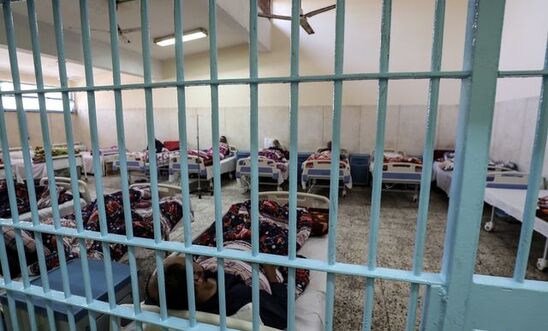
Press releases
Egypt: detainees in severely overcrowded jails being denied healthcare - new report

Ten years on from 2011 protests, Sisi’s jails now packed with those at forefront of reform movement
Detainees in twice-capacity jails denied healthcare and at complete mercy of guards
Report charts fate of 67 detainees, ten of whom died in custody and two shortly after release
‘It constitutes torture’ - Philip Luther
Prison officials in Egypt are subjecting prisoners of conscience and others held for political reasons to torture and deliberately denying them healthcare to punish their dissent, Amnesty International said in a damning new report today, the tenth anniversary of Egypt’s popular uprising in 2011 against Hosni Mubarak’s authoritarian rule.
Amnesty’s 74-page report - ‘What do I care if you die? Negligence and denial of health care in Egyptian prisons - shows how the callousness of the country’s prison authorities has led to numerous deaths in custody and irreparable harm to prisoners’ health.
Amnesty’s report documents the fate of 67 detainees in three women’s prisons and 13 men’s jails in seven governorates - ten of the prisoners died in custody and two died shortly after their release. The authorities in the 16 jails have subjected prisoners to cruel and inhuman treatment, with prison officials routinely failing to provide prisoners with adequate healthcare - either through neglect or deliberate denial.
There is evidence that the prison authorities target some prisoners to punish them for their perceived opposition to or criticism of the government. Reprisals included being held in solitary confinement for 22-23 hours a day, being denied family visits for periods of up to four years, and being deprived of food packages or other necessities from relatives.
Amnesty’s reports shows that prison infirmaries are generally unsanitary and lack equipment and qualified health professionals - with prison doctors often only giving painkillers regardless of symptoms and even verbally abusing prisoners, sometimes accusing them of “terrorism” and “moral delinquency”. Two female former detainees said medical staff sexually abused and harassed them. Former detainees also said there was no clear mechanism to seek medical help even in emergencies, and that they were completely at the mercy of guards and prison officials who frequently ignored their pleas. Virtually no mental health services are provided in prison.
One detainee, Abdelmoniem Aboulfotoh, 69, a former presidential candidate and founder of the Misr Al-Qawia opposition party, has been arbitrarily detained in solitary confinement in the notorious Tora Prison since February 2018. He suffers from diabetes, high blood pressure and an enlarged prostate, yet the authorities have repeatedly denied his requests for transfer for treatment outside the prison and frequently delayed access to even prison doctors.
Despite these concerns, the Egyptian authorities refuse to disclose the number of prisoners being held across the country - though estimates put it at 114,000, more than double the official prison capacity of 55,000. Hundreds of detainees in the 16 jails Amnesty examined are crammed into cells with an estimated average 1.1m² floor space available per prisoner, far less than the 3.4m² minimum recommended by the Red Cross.
In December, Amnesty communicated its report findings to the Egyptian authorities but has to date received no response.
Philip Luther, Amnesty International’s Middle East and North Africa Director, said:
“Prison officials show utter disregard for the lives and wellbeing of prisoners crammed into the country’s overcrowded prisons, and largely ignore their health needs.
“It is deplorable that the Egyptian authorities are seeking to intimidate and torment human rights defenders, politicians, activists and other actual or perceived opponents by denying them healthcare. When the denial causes severe pain or suffering and is a deliberate act for the purpose of punishment, it constitutes torture.
“The Egyptian authorities must allow independent experts unfettered access to prisons, and work with them on addressing the abysmal conditions of detention and access to healthcare before more lives are tragically lost.”
Deaths in custody
Amnesty investigated 12 deaths in custody - or deaths shortly after release - and is aware of 37 other cases from last year. Egyptian human rights groups estimate that hundreds have died in custody since 2013 amid an official refusal to disclose figures or carry out proper investigations into deaths. Shady Habash, a 24-year-old filmmaker, died on 2 May 2020 after prison staff at Tora Investigations Prison failed to urgently transfer him to an outside hospital, despite knowing he was suffering from alcohol poisoning.
Coronavirus
The Egyptian authorities continue to ignore calls to reduce the prison population amid COVID-19 outbreaks, endangering yet more lives. In fact, 4,000 fewer people were released in 2020 than in 2019 through presidential pardons and conditional releases. In the face of the pandemic, prison administrations have failed to regularly distribute sanitary products, trace and screen new arrivals, or test and isolate those suspected of infection. In some prisons, detainees have been quarantined in small, dark cells used for solitary confinement. In others, they have been left in their own cells thus endangering fellow prisoners.